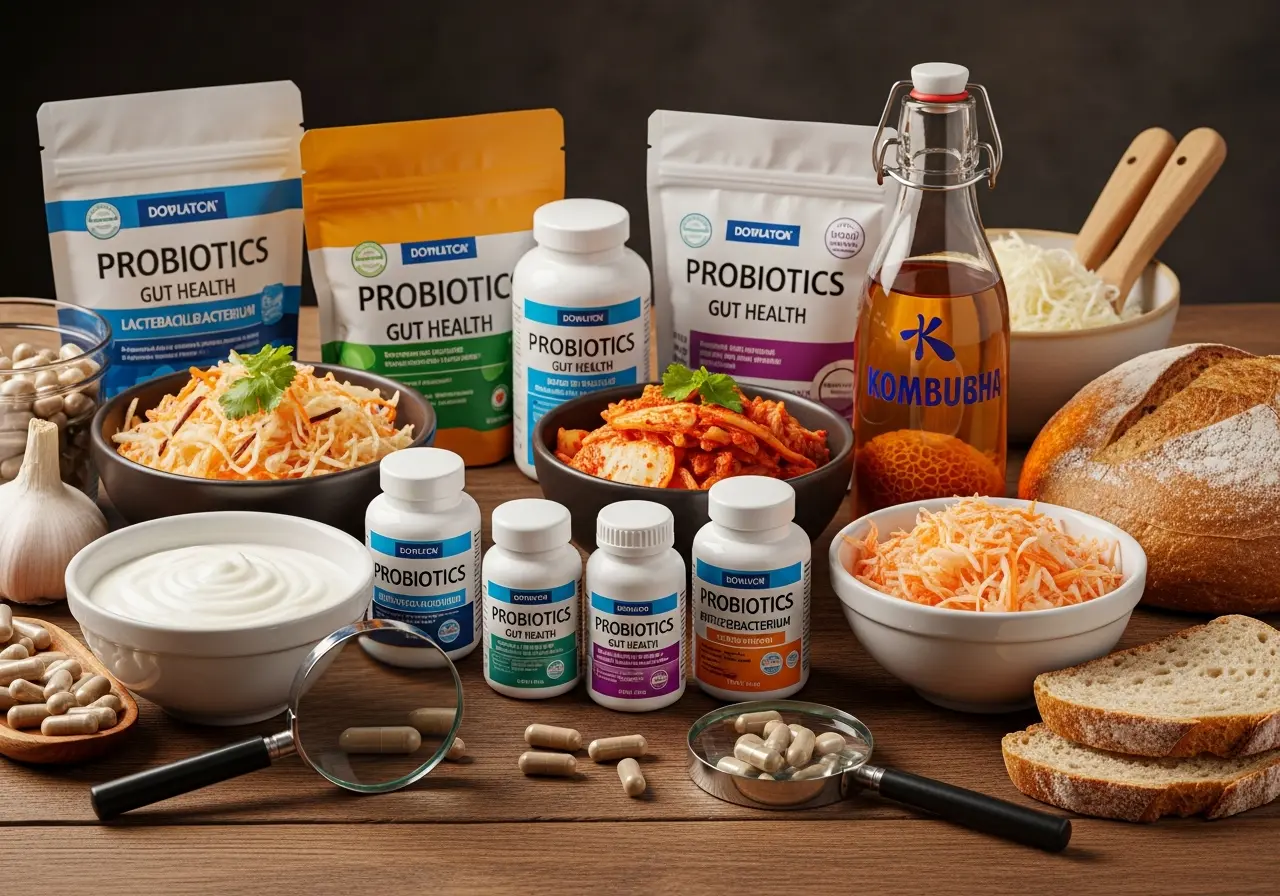What Are Probiotics?
Probiotics are defined as live microorganisms—primarily bacteria and yeasts—that, when administered in adequate amounts, confer a health benefit on the host. These are often referred to as “good” or “friendly” bacteria because they play a crucial role in maintaining the balance and function of the gut microbiome. While bacteria often carry a negative connotation, the human body naturally hosts trillions of these microorganisms, and probiotics are specific strains designed to supplement or restore this vital internal ecosystem.
What Do Probiotics Do?
Probiotics perform several critical functions within the gastrointestinal tract, contributing significantly to overall health:
1. Maintaining Microbial Balance
Probiotics help the gut maintain a healthy ratio of beneficial to harmful microorganisms. If the balance is disrupted by antibiotics, illness, or diet (a state known as dysbiosis), probiotics help crowd out pathogenic bacteria and yeasts, preventing them from multiplying and causing infection or inflammation.
2. Enhancing Digestive Function
Certain strains aid in the digestion of complex carbohydrates and fiber that the human body cannot break down on its own. This process produces beneficial short-chain fatty acids (SCFAs), such as butyrate, which is the primary energy source for the cells lining the colon, maintaining gut barrier integrity.
3. Strengthening the Gut Barrier
The gut lining acts as a physical barrier against toxins and pathogens. Probiotics reinforce this barrier by promoting the production of mucus and tight junction proteins, reducing intestinal permeability (often referred to as “leaky gut”).
4. Nutrient Production and Absorption
Specific probiotic strains, such as Bifidobacterium, can synthesize B vitamins (like folate and biotin) and Vitamin K. They also aid in the absorption of minerals like calcium and magnesium by making them more soluble.
5. Modulating the Immune System
A significant portion of the body’s immune system resides in the gut. Probiotics interact directly with immune cells, helping to train the immune system, regulate inflammatory responses, and distinguish between threats and harmless substances.
When Are Probiotics Recommended?
Probiotics are most commonly recommended in situations where the gut microbiome has been compromised or when specific health conditions can be alleviated by promoting gut balance.
Following Antibiotic Use
Antibiotics are highly effective at killing harmful bacteria, but they also severely deplete the beneficial bacteria in the gut. Taking probiotics (ideally starting shortly after the antibiotic course begins and continuing for a few weeks after it ends) can help prevent antibiotic-associated diarrhea (AAD) and restore microbial diversity.
For Specific Digestive Disorders
Probiotics are often recommended as a complementary therapy for conditions such as:
- Irritable Bowel Syndrome (IBS): Certain strains can help reduce symptoms like bloating, gas, and abdominal pain.
- Inflammatory Bowel Disease (IBD): While research is ongoing, some strains may help maintain remission in patients with ulcerative colitis.
- Infectious Diarrhea: Probiotics can shorten the duration and severity of diarrhea caused by viral or bacterial infections.
Supporting Overall Wellness
Probiotics are increasingly used to support immune function, improve mood (via the gut-brain axis), manage weight, and improve skin health, although the effects are highly strain-specific and dependent on individual factors.
Which Probiotics Are Effective?
The effectiveness of a probiotic is highly dependent on the specific strain used and the condition being targeted. Probiotics are generally categorized by their genus, species, and alphanumeric strain designation (e.g., Lactobacillus rhamnosus GG).
Key Genera and Strains:
- Lactobacillus: A very common genus found in yogurt and fermented foods. Strains like L. acidophilus and L. rhamnosus GG are well-studied for general digestive support and diarrhea prevention.
- Bifidobacterium: Often dominant in the colons of healthy individuals. Strains like B. lactis and B. longum are frequently used to manage IBS and antibiotic side effects.
- Saccharomyces boulardii: A unique probiotic yeast (not a bacterium). It is particularly effective for preventing and treating infectious and antibiotic-associated diarrhea, as it is resistant to antibiotics.
Crucial Considerations for Effectiveness:
- Strain Specificity: Research the specific strain proven for the health benefit you seek (e.g., not all Lactobacillus strains treat the same conditions).
- Viability and CFU Count: Ensure the product label specifies a high number of Colony Forming Units (CFUs) at the time of expiry, typically in the billions, and is stored correctly (some require refrigeration).
- Delivery System: Some probiotics are formulated to be acid-resistant to survive the harsh environment of the stomach.
Risks and Benefits of Taking Probiotics
Benefits
The benefits of taking targeted probiotics are well-documented:
- Restored Gut Flora: Rapid re-establishment of beneficial bacteria after disruption (e.g., illness or medication).
- Improved Digestion: Reduction of common digestive discomforts such as bloating, constipation, and gas.
- Enhanced Immunity: Better immune responses and reduced risk of certain infections, particularly in the respiratory and urinary tracts.
- Mental Well-being: Emerging evidence suggests a positive influence on mood and stress management through the gut-brain axis.
Are There Any Risks or Side Effects to Taking Probiotics?
For the vast majority of healthy individuals, probiotics are considered safe and well-tolerated. Side effects are usually mild and temporary:
- Initial Digestive Discomfort: Some people may experience temporary gas, bloating, or mild stomach upset as the body adjusts to the changes in the gut flora. These symptoms typically subside within a few days or weeks.
- Allergic Reactions: As with any supplement, there is a remote risk of allergic reactions to the ingredients in the capsule (fillers, yeast, dairy components).
- Immunocompromised Individuals: In very rare cases, particularly in individuals who are severely immunocompromised (e.g., those with central venous catheters, recent surgery, or critical illness), there is an extremely low risk of developing a systemic infection (sepsis) from the probiotic organisms themselves. Probiotics should only be taken under strict medical supervision in these populations.
Always consult a healthcare provider before starting any new supplement regimen, especially if you have a chronic medical condition or are undergoing medical treatment.
Top 10 Frequently Asked Questions (FAQ)
1. Should I take probiotics with food or on an empty stomach?
The best time depends on the specific product, but generally, taking probiotics with a small amount of food (like breakfast) or 30 minutes before a meal can help buffer stomach acid and improve bacterial survival.
2. Do all yogurts contain live probiotics?
No. While many yogurts are made with live bacterial cultures, the heat treatment process used to make some yogurts shelf-stable can kill the bacteria. Look for the phrase “Live and Active Cultures” on the label.
3. Can I take probiotics while I am taking antibiotics?
Yes, and it is highly recommended. Take the probiotic a few hours after your antibiotic dose to minimize the chance of the antibiotic killing the beneficial bacteria. Continue the probiotic for at least two weeks after finishing the antibiotics.
4. How long should I continue taking probiotics?
This depends entirely on your goal. For acute issues like antibiotic-associated diarrhea, a few weeks may suffice. For chronic conditions like IBS or general wellness, continuous daily supplementation may be necessary, and you should discuss this duration with your doctor.
5. Are prebiotics the same as probiotics?
No. Probiotics are the live beneficial bacteria, while prebiotics are specialized types of dietary fiber (food) that non-digestible by humans but selectively feed and stimulate the growth of beneficial gut bacteria already present.
6. Can I get enough probiotics from diet alone?
It is possible, but difficult to achieve therapeutic doses for specific conditions. Fermented foods like yogurt, kefir, sauerkraut, and kimchi are excellent sources, but supplements provide targeted, concentrated amounts of specific strains proven to be effective.
7. Is a higher CFU count always better?
Not necessarily. While billions are better than millions, the strain specificity and viability are more important than the raw number. A lower CFU count of a proven, highly viable strain is often more effective than a very high count of an unproven or non-viable strain.
8. Should I refrigerate my probiotics?
Some probiotic strains are sensitive to heat and moisture. If the label instructs refrigeration, follow it strictly to maintain the viability (live count). If the product is labeled “shelf-stable,” refrigeration is not required.
9. Can children take probiotics?
Yes, probiotics are often used in children, particularly for managing infant colic, infectious diarrhea, and preventing AAD. Always choose a product specifically formulated for children and consult a pediatrician for dosage guidance.
10. Does stool analysis help determine which probiotic I need?
While stool analysis can provide a snapshot of your current microbial diversity (identifying dysbiosis), it does not definitively prescribe a specific probiotic. A healthcare professional typically uses symptoms, medical history, and clinical evidence to choose the appropriate, research-backed strain.



